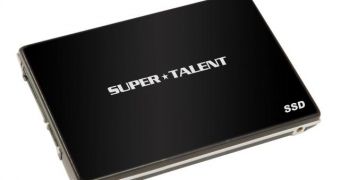Offering a new solid state drive (SSD) storage solution for high-end enterprise and database server applications is Super Talent Technology, which has been working on a product based on the new and advanced SandForce SF-1500 SSD processor. Known as the TeraDrive FT2 SSD, the storage unit operates on the SATA 3Gbps interface and achieves write speeds of up to 250MB/s.
“Super Talent has a solid track record of developing leading edge SSDs. Their new TeraDrive series, incorporating SandForce technology, is an impressive advance in enterprise storage,” Thad Omura, VP Marketing at SandForce Inc., commented.
“We engineered the TeraDrive FT2 for optimum performance and reliability in server applications, especially where fast random access to small files is needed,” Joe James, director of marketing at Super Talent, added.
The single-level cell (SLC) 2.5-inch drives from Super Talent come in storage capacities of 50GB and 100GB, whereas the models based on multi-level cell (MLC) also come in a storage capacity of 200GB. The company claims that the aforementioned sequential read and write speeds of 250MB/s will not degrade over time and that the transaction speeds achievable are of up to 30,000 IOPS.
Special features of this enterprise and database server storage solution include the RAISE technology. This feature enhances reliability, while the DuraWrite technology significantly increases the endurance of the drive. DuraWrite also enables an advanced wear-leveling, bad block management and ECC capable of up to 24 symbols correctable per 512 byte sector.
The high functionality and strong performance of the drives is complemented by their lifespan, which makes them all the more suited as part of professional installments. The mean time before failure (MTBF) of all units surpasses one million hours.
Super Talent will start shipping samples of both the SLC and MLC drives during the ongoing month. Volume production is set to commence sometime during the later parts of the first quarter of 2010.

 14 DAY TRIAL //
14 DAY TRIAL //